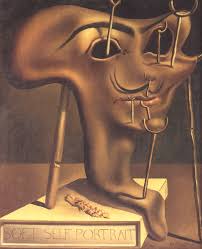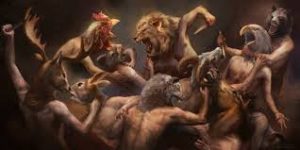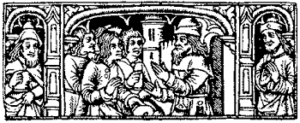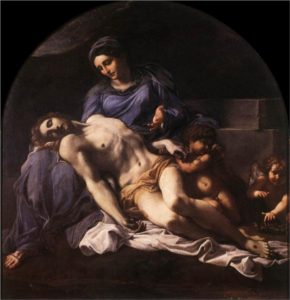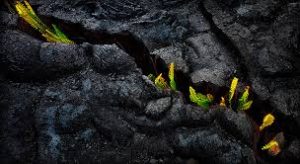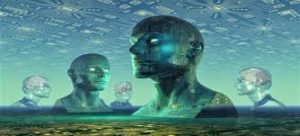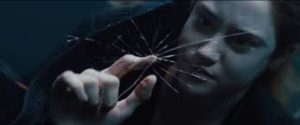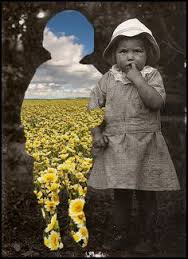They are the smallest imaginable “packages” of consciousness that we can imagine, and despite any ideas to the contrary, basically consciousness has nothing to do with size. If that were the case, it would take more than a world-sized globe to contain the consciousness of simply one cell.
So our physical life is the result of a spectacular spontaneous order — the order of the body spontaneously formed by the units of consciousness. Our experience of the world is largely determined by our imaginations and our reasoning abilities. These did not develop through time, as per usual evolutionary beliefs. Both imagination and reason belonged to the species from the beginning, but the species has used these qualities in different ways throughout what we think of as historic time. There is great leeway in that direction, so that the two can be combined in many many alternate fashions, each particular combination giving us its own unique picture of reality, and determining our experience in the world.
Our many civilizations, historically speaking, each with its own fields of activity, its own sciences, religions, politics and art — these all represent various ways that man has used imagination and reason to form a framework through which a more or less cohesive reality is experienced.
Man and woman, then, has sometimes stressed the power of the imagination and let its great dramatic light illuminate the physical events about him or her, so that they were largely seen through its cast. Exterior events in those circumstances become magnets attracting the dramatic force of the imagination. Inner events are stressed over exterior ones. The objects of the world then become important not only for what they are but because of their standing in an inner world of meaning. In such cases, of course, it becomes quite possible to go so far in that direction that the events of nature almost seem to disappear amid the weight of their symbolic content.
In recent times the trend has been in the opposite direction, so that the abilities of the imagination were considered highly suspect, while exterior events were considered the only aspects of reality. We ended up with a true-or-false kind of world, in which it seemed that the answers to the deepest questions about life could be answered quite correctly and adequately by some multiple-choice test. Man’s and woman’s imagination seemed then to be allied with falsehood, unless its products could be turned to advantage in the materialistic existence. In that context, the imagination was tolerated at all only because it sometimes offered new technological inventions.
I have taken two contrasting examples of the many ways in which the powers of the imagination and those of the reasoning abilities can be used. There are endless varieties, however — each subjectively and genetically possible, and many, of course, that we have yet developed as a species.
Why would an individual form the reality of schizophrenic behavior?
On the question of “mental disorders,” it is highly important that individual integrity be stressed, rather than the blanket definitions that are usually accorded to any group of symptoms. In many such circumstances, however, such individuals are combining the imagination and the reasoning abilities in ways that are not in keeping with their historic periods. It would not be entirely out of keeping, though somewhat exaggerated a statement, to claim that men and women who stockpile nuclear weapons in order to preserve peace are insane. In our society, such activities are, in a way that completely escapes me, somehow under the label of humanitarianism!
Such plans are not considered insane ones — though in the deepest meaning of that word, they are indeed. There are many reasons for such actions, but an overemphasis upon what we think of as the reasoning abilities, as opposed to what we think of as imaginative abilities, is at least partially to blame.
In the schizophrenic case, we have a mixture of those characteristics in which interior events — the events of the imagination — cast too strong a light upon physical events as far as the socially accepted blend is concerned. Again, I am not speaking about all cases of mental disorder here. I do however, want to make the point that our prized psychological norm as a species means that we must also be allowed a great leeway in the use of the imagination and the intellect. Otherwise, we could become locked into a rigid conscious stance, one in which both the imagination and the intellect could advance no further. It is vitally important that we realize the great psychological diversity that is present within our psychological behavior — and those varieties of psychological experience are necessary. They give us vital psychological feedback, and they exercise the reaches of our abilities in ways that are overall most advantageous.
The schizophrenic man or woman wants to live largely in his or her own world. He or she hurts no one. He and she supports himself or herself a good deal of the time. His or her view of reality is eccentric from most viewpoints. He or she adds a flavor to the world that would be missing otherwise, and through his or she very eccentricity, to some extent he and she shows other people that their rigid views of reality may indeed have chinks in them here and there.
I do not mean to idealize the schizophrenic either, or others of his or her kind, but to point out that we can use our imaginations and intellect in other fashions than we do. In fact, such fashions are not only genetically possible, but genetically probable — a matter I will discuss in later blogs. The imagination, of course, deals with the implied universe, those vast areas of reality that are not physically manifest, while reason usually deals with the evidence of the world that is before it. That statement is generally true, but specifically, of course, any act of the imagination involves reasoning, and any act of reason involves the imagination.


































